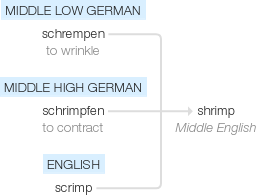Shrimp
Middle English: probably related to Middle Low German schrempen ‘to wrinkle’, Middle High German schrimpfen ‘to contract’, also to scrimp.
wiktionary
From Middle English schrimpe(“shrimp, puny person”), ultimately from Proto-Germanic *skrimpaz(“shrivelled”) (compare Middle High German schrimpf(“a scratch, minor wound”), Norwegian skramp(“thin horse, thin man”)), from Proto-Germanic *skrimpaną(“to shrivel”) (compare Old English sċrimman(“to shrink”) and scrimp, Middle High German schrimpfen(“to shrink, dry up”), Swedish skrympa(“to shrink”)), from Proto-Indo-European *skremb-, *skr̥mb- (compare Lithuanian skrembti(“to crust over, stiffen”), and possibly Albanian shkrumb(“embers, ashes; crumble”)).
etymonline
shrimp (n.)
early 14c., "slender, edible marine crustacean," probably from Old Norse skreppa "thin person," from Proto-Germanic *skrimp- (see scrimp). Related to Old English scrimman "to shrink;" the connecting notion is probably "thinness" (compare Danish dialectal skrimpe "thin cattle"). The meaning "puny person" in English is attested from late 14c.; an especially puny one might be a shrimplet (1680s).
shrimp (v.)
"fish for shrimp," 1801 (implied in shrimping ), from shrimp (n.). Related: Shrimper (1808).
